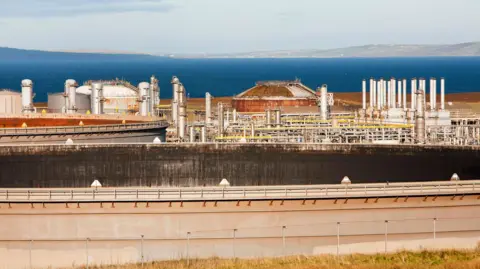Job cuts at oil terminal 'significant' says union
 Getty Images
Getty ImagesAt least 29 jobs have been cut at the Flotta oil terminal in Orkney.
The trade union Unite has described the job losses at the site - which leave a work force of 156 - as a "significant reduction".
The Flotta terminal has been a critical piece of North Sea infrastructure since 1977.
In a statement, main contractor Petrofac said it had collaborated with terminal operators Repsol UK and Unite to introduce "job sharing and a voluntary redundancy scheme to reduce the number of colleagues affected."
A total of 12 Repsol employees have left, mostly through voluntary redundancy.
It now has 51 staff at the terminal, with some moving to part time roles to stay in employment.
The main contractor at the site is Petrofac which has carried out 17 compulsory redundancies - which it said was in response to the changing needs of its client - leaving it with about 40 workers at Flotta.
Two other contractors, Altrad and ESS, also operate at the terminal.
Unite claims "hostile" polices towards oil and gas are partly to blame for the cuts.
The UK government has said its Energy Profits Levy, known as the windfall tax, aims to ensure North Sea oil and gas producers contribute their fair share towards energy transition.
New ownership
At its height, the Flotta oil terminal processed 400,000 barrels of oil a day.
The oil is delivered by pipeline from North Sea oil fields and then shipped away by oil and gas tankers.
Recently the flow of oil has slowed but the facility is expected to remain in operation until the early 2030s.
Repsol UK has investigated green hydrogen production at the Flotta site and creating a decommissioning hub but the plans have come to nothing.
The terminal is due to pass into new ownership later this year when a deal between Repsol UK and Norway's Neo Energy is completed.
The new company, Neo Next, will be controlled by the Norwegian company, which will have the majority share.
